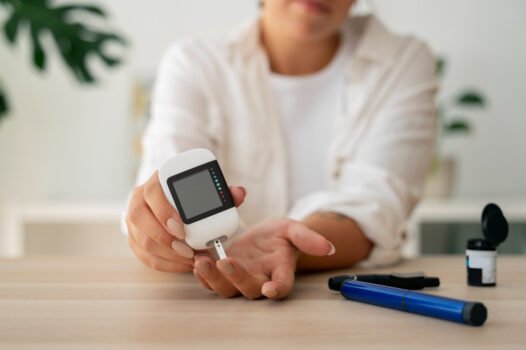Diabetes Comprehensive Guide
What is Diabetes?
Diabetes is a chronic medical condition that occurs when the body cannot properly regulate blood sugar (glucose) levels. This happens either due to insufficient insulin production by the pancreas or the body’s inability to effectively use insulin. Uncontrolled diabetes can lead to serious health complications over time.
Classify Diabetes
Condition: Diabetes is classified as a chronic metabolic disorder affecting glucose metabolism, insulin function, and overall energy balance in the body.
Diabetes Statistics
- Globally, 537 million adults (20–79 years) were living with diabetes in 2021.
- In the UK, 4.9 million people have been diagnosed with diabetes.
- Type 2 diabetes accounts for approximately 90% of all cases.
Types of Diabetes
- Type 1 Diabetes: Autoimmune condition where the pancreas produces little or no insulin.
- Type 2 Diabetes: The body becomes resistant to insulin or doesn’t produce enough.
- Gestational Diabetes: Develops during pregnancy and usually resolves after delivery.
- Prediabetes: Elevated blood sugar levels that are not high enough for a diabetes diagnosis.
Health Signs and Symptoms
Early Detection: Monitoring for symptoms is crucial for early diagnosis and treatment.
Common Signs and Symptoms:
- Increased thirst and frequent urination
- Extreme hunger
- Unexplained weight loss
- Fatigue
- Blurred vision
- Slow-healing sores or frequent infections
- Tingling or numbness in hands and feet (Type 2)
Anatomy and Physiology
Body Parts Affected by Diabetes:
- Pancreas: Produces insulin.
- Liver: Stores and releases glucose.
- Kidneys: Filter excess sugar, leading to potential damage.
- Heart and Blood Vessels: Increased risk of cardiovascular disease.
- Eyes: Retinopathy and vision problems.
- Nervous System: Neuropathy and nerve damage.
Causes
Description: Diabetes arises from genetic, lifestyle, and environmental factors.
Common Causes:
- Type 1 Diabetes: Autoimmune attack on pancreatic cells.
- Type 2 Diabetes: Insulin resistance, often linked to obesity and inactivity.
- Gestational Diabetes: Hormonal changes during pregnancy.
Diabetes Stages
- Prediabetes: Mildly elevated blood sugar levels.
- Early Stage: Noticeable symptoms like thirst and frequent urination.
- Advanced Stage: Complications such as nerve, kidney, and eye damage.
Prevention
- Maintain a healthy weight.
- Follow a balanced, low-sugar diet.
- Exercise regularly (150 minutes per week).
- Avoid smoking and limit alcohol consumption.
- Regular check-ups and blood sugar monitoring.
Diabetes Diagnosis
Common diagnostic methods include:
- Fasting Blood Sugar Test: Measures blood glucose levels after fasting.
- HbA1c Test: Reflects average blood sugar over 2–3 months.
- Oral Glucose Tolerance Test (OGTT): Measures glucose levels before and after consuming a sugary drink.
Tests & Examinations
- Blood sugar tests (fasting and random).
- HbA1c (glycated hemoglobin) test.
- Urine tests to check for glucose or ketones.
- Cholesterol and blood pressure tests.
Health Professionals
- Endocrinologists: Specialize in diabetes and hormone disorders.
- Primary Care Physicians: Monitor and manage general diabetes care.
- Diabetes Educators: Provide education and self-care management plans.
- Dietitians: Offer guidance on nutrition and meal planning.
- Podiatrists: Address foot care to prevent complications.
Reasons to See a Professional
- Persistent symptoms of high blood sugar.
- Difficulty managing blood sugar levels.
- Unexplained weight loss or frequent infections.
- Development of diabetes-related complications.
Process to Find the Right Professional
- Ask for referrals from your GP.
- Search for certified endocrinologists or diabetes specialists.
- Check online reviews and verify credentials.
Visit Preparation
- Keep a log of blood sugar readings.
- List symptoms, medications, and questions for the doctor.
- Bring relevant medical history and test results.
Questions to Ask
- What type of diabetes do I have?
- What treatment options are available?
- How can I manage my blood sugar effectively?
- What complications should I watch for?
- How often should I check my blood sugar?
Diagnosis
Diabetes is diagnosed through blood tests that measure glucose levels. The HbA1c test is often used to confirm long-term blood sugar management.
Procedures
- Blood sugar monitoring.
- Retinopathy screening for eye damage.
- Neuropathy testing for nerve health.
Treatments
- Type 1 Diabetes: Insulin injections or pumps.
- Type 2 Diabetes: Oral medications (e.g., metformin) and lifestyle changes.
- Gestational Diabetes: Diet, exercise, and sometimes insulin.
Health Monitoring
- Use a glucose meter for daily monitoring.
- Continuous Glucose Monitors (CGMs) for real-time tracking.
- Regular check-ups for complications like kidney or eye damage.
How to Manage Diabetes
- Follow a diabetes-specific meal plan.
- Stay active and maintain a healthy weight.
- Monitor blood sugar levels regularly.
- Take prescribed medications on time.
- Learn to recognize and manage hypoglycemia or hyperglycemia.
Nutrition Dos and Don’ts
Dos:
- Eat whole grains, vegetables, and lean protein.
- Opt for low-glycemic index foods.
- Control portion sizes.
Don’ts:
- Avoid sugary beverages and processed snacks.
- Limit refined carbohydrates.
- Don’t skip meals.
Lifestyle Dos and Don’ts
Dos:
- Exercise regularly.
- Manage stress through relaxation techniques.
- Keep a consistent sleep schedule.
Don’ts:
- Avoid sedentary lifestyles.
- Don’t ignore symptoms of high or low blood sugar.
- Limit alcohol consumption.
Emergency Situations
Hypoglycemia (low blood sugar): Treat with fast-acting carbs like glucose tablets or juice.
Hyperglycemia (high blood sugar): Seek medical help if persistent.
Diabetic Ketoacidosis: A medical emergency requiring immediate care.
Prognosis
With proper management, most people with diabetes can live healthy lives. However, uncontrolled diabetes may lead to complications like cardiovascular disease, neuropathy, and kidney damage.
Clinical Products
- Insulin Pumps: For continuous insulin delivery.
- Glucose Meters: For daily blood sugar monitoring.
- Continuous Glucose Monitors (CGMs): Real-time tracking of glucose.
- Ketone Test Strips: Detect ketone levels in urine.
- Diabetic Shoes: Prevent foot complications.
Services
- Diabetes Clinics: Specialized care for managing diabetes.
- Nutritional Counseling: Tailored diet plans.
- Telemedicine Apps: Remote diabetes monitoring.
- Support Groups: Emotional and practical support.
- Insurance Plans: Coverage for medications and devices.
Frequently Asked Questions
- Can diabetes be cured? No, but it can be managed effectively.
- What’s the difference between Type 1 and Type 2? Type 1 is autoimmune; Type 2 is often lifestyle-related.
- Can I still eat sugar? Yes, in moderation as part of a balanced diet.
- How often should I test my blood sugar? Follow your doctor’s recommendation.
- Is diabetes hereditary? Genetics can play a role, especially in Type 2.
- What are the early symptoms? Increased thirst, urination, and fatigue.
- Can exercise reverse diabetes? It helps manage Type 2 but doesn’t reverse it.
- Do I need insulin for Type 2? Not always; it depends on the progression.
- What complications should I watch for? Neuropathy, retinopathy, and kidney damage.
- How do I prevent diabetes? Maintain a healthy lifestyle with regular exercise and a balanced diet.
The Hosst.com Platform uses a Digital Twin to help users manage their health by tracking, organising, and optimising healthcare activities. It provides personalised insights and assists with scheduling checkups, tests, and doctor visits.
Key features include:
- Symptom management: Recommends tests and treatments based on user input.
- Health data tracking: Monitors glucose, blood pressure, and more from health devices or manual inputs. Connects with your favorite apps and health monitors.
- Alerts: Warns of abnormal health signs and suggests corrective actions.
- Lifestyle recommendations: Offers diet, medication, and lifestyle tips based on health trends.
- Test result interpretation: Simplifies complex results and explains what they mean for the user.
- Preventive care: Sends reminders for checkups and suggests actions to prevent illness.
- Health scenario simulations: Predicts potential health outcomes based on current data.
- Product and service finder: Helps users find the right healthcare product or service.
- Doctor visit preparation: Gathers vitals, history, insurance, and questions for productive visits, with easy sharing to doctors.
- User-friendly: Ask in your own words, available on tablets, desktops, and mobile devices.
The platform simplifies health management and improves well-being. Free and easy to use and no installation required, get started today.
Disclaimer: The information provided in these articles is for informational purposes only and is not a substitute for professional medical advice, diagnosis, or treatment. Always consult with a qualified healthcare professional before making any decisions about your health or starting any treatments.
Photo credits Freepik.com






